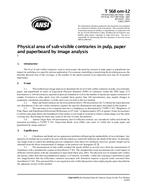Description
This method uses image analysis to determine the level of sub-visible contraries in pulp, recycled pulp,paper, and paperboard in terms of Equivalent Physical Diameter (EPD) of contraries within the EPD range of 8micrometers to 160 micrometers, reported in parts per hundred as well as the number of specks per square centimeter of sample. Extension to other speck sizes (for example those greater than 160 micrometers), may require changes in equipment, calculation procedures, or both, and is not covered in this test method.
Paper and board surfaces are far from uniform below 100 micrometers (1). To obtain the truest physicalsize distribution of the sub-visible contraries requires the specific illumination and optics described in this method.
The specimen to be evaluated must have a brightness, as determined by TAPPI T 452 “Brightness ofPulp, Paper, and Paperboard (Directional Reflectance at 457 nm),” of approximately 20% or greater. It may be necessary to reform some pulp sheets into handsheets if the surface is too rough or textured to obtain a sharp image over the entire viewing area. Reforming the sheet may result in the loss of some ink particles.
Specks larger than 160 micrometers, and of sufficient contrast, are considered visible and should bemeasured according to TAPPI T 563 “Equivalent Black Area (EBA) and count of visible dirt in pulp, paper andpaperboard by image analysis”.
Product Details
- Published:
- 2012
- ANSI:
- ANSI Approved
- Number of Pages:
- 6
- File Size:
- 1 file , 110 KB
- Redline File Size:
- 2files, 480 KB
